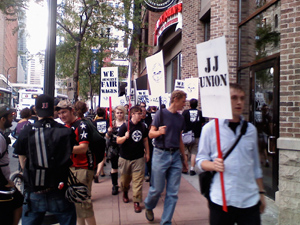Submitted on Fri, 10/22/2010 - 2:11pm
Potential Turning Point for Working Poor as Millions Face Deepening Poverty
 Jimmy Johns Workers Union (Industrial Workers of the World) Contact: Mike Wilkow, 612-807-6633 | October 22, 2010.
Jimmy Johns Workers Union (Industrial Workers of the World) Contact: Mike Wilkow, 612-807-6633 | October 22, 2010.
MINNEAPOLIS– 200 workers at ten Minneapolis-area Jimmy John's will vote on unionization today, an historic first in the nation's almost entirely non-union fast food industry. The secret ballot union election could hold profound implications for millions of Americans employed in low-wage service sector jobs.
“We are standing up for quality jobs for working families, for a future for young workers, and for dignity and respect for all working people. Business as usual has been a disaster for poor and working people in America. We are going to take the power back,” said Ayo Collins, a Jimmy John’s employee and union member.
The unprecedented fast food union campaign at Jimmy John's comes at a time of deepening economic misery for US workers. According to the US Census Bureau, a record-breaking 43.6 million Americans– 1 in 7 people– are living in poverty. As higher-paying jobs get harder to find due to outsourcing, layoffs, and the recession, many workers are forced to seek work in one of the economic areas adding the most jobs: the food service sector. Employment in the food service industry is expected to grow 15% from 2008 to 2018, significantly higher that the 10.1% average rate predicted by the Bureau of Labor Statistics for all industries.
While millions of workers can expect to find employment in food service in the next decade, wages and working conditions in the industry are widely regarded as substandard; in 2009, the median wage in the fast food industry was only $8.28/hr. As of July 2010, the average workweek in fast food was only 24.3 hours. The median annual income for fast food workers is $10,462, or $871 per month. This is less than half the federal poverty line of $21,954 for a family of four.
Unionization holds a strong allure to poverty-wage food service workers. According to figures released by the Bureau of National Affairs, union members in the food service industry earned on average $2.36 more per hour, a 32% difference, than non-union workers in the same industry in 2009.
Despite the appeal of higher wages and better benefits, union density in the fast food industry is stuck at only 1.8%, far below the national average of 12.3%. Unionization efforts have been stymied by stiff employer resistance and professional “union avoidance” firms that specialize in thwarting NLRB election campaigns.
The workers at Jimmy Johns hope to change this by inspiring others to follow in their footsteps. “We’ve been in touch with fast-food workers across the country who are so excited about this that they’re thinking about unionizing their own workplaces,” said Collins.
The all-volunteer union campaign at Jimmy Johns has defied the expectations of labor experts and business analysts alike.
“Service industry jobs are the future and our future needs to have quality jobs for working families with living wages, affordable healthcare, paid time off, consistent hours, and basic respect. It's time for change in America, we hope this will be a turning point for all workers,” said Collins.
The Jimmy Johns Workers Union, open to employees at the company nationwide, is the first fast food union in the nation, and is affiliated with the Industrial Workers of the World labor union. Gaining prominence in recent years for organizing Starbucks workers, the IWW is a global union founded over a century ago for all working people.